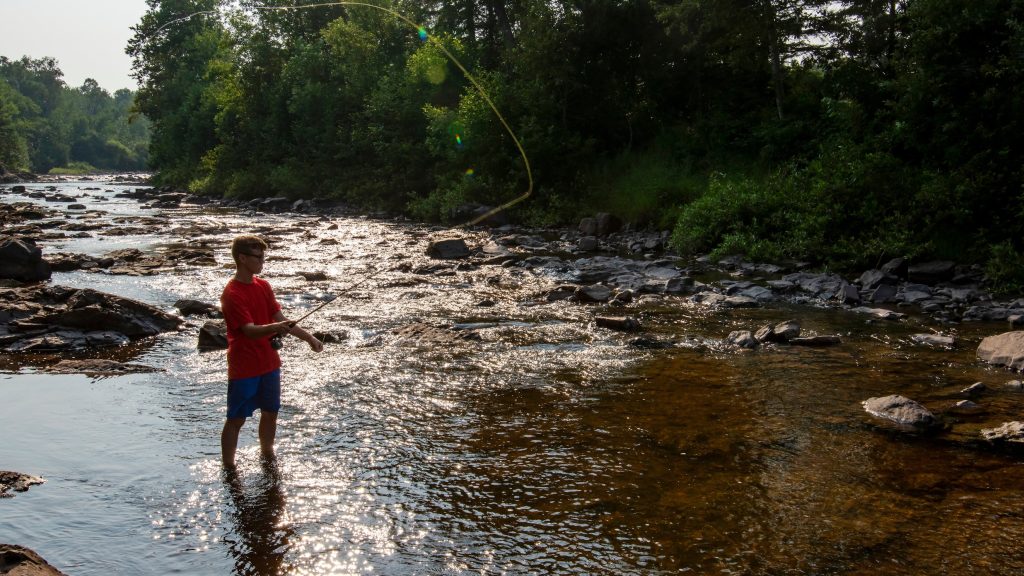By Chris Roberts, Licensed Clinical Social Worker
In today’s fast-paced, screen-driven world, the need to reconnect with nature has never been greater. For underserved youth, but really for nearly everyone, that connection can be transformative.
Cast Hope, a 501(c)(3) nonprofit organization, is dedicated to providing young people with the gift of the outdoors through the sport of fly fishing. Focused on underserved youth aged 10-18, Cast Hope partners with organizations like the Boys & Girls Club, Wilderness Experience, Youth 4 Change, Environmental Alternative, and Big Brothers and Sisters to create opportunities for growth, healing, and community.
At its core, Cast Hope strives to teach healthier coping skills to children through fly fishing. For many of these young individuals, the simple act of fishing and being outdoors provides an ideal way to cope with stress and find intrinsic balance. Beyond being a fun and engaging hobby, fishing offers a wealth of benefits—physical, mental, and emotional—that contribute to a child’s overall well-being.
The Benefits of Fly Fishing for Mental Health
Fly fishing is more than a recreational activity; it’s a pathway to mental health and resilience. Outdoor movement, such as casting and wading through streams, promotes better sleep, boosts immunity through vitamin D absorption, and supports heart health. But the benefits go deeper. For children with challenges like PTSD or autism, the sport’s repetitive and meditative aspects can create a calming effect that regulates emotions and reduces stress.
Research shows that outdoor activities can decrease symptoms of depression, thanks to the release of endorphins and the natural regulation of breathing. The reduction of cortisol, the body’s stress hormone, is another vital benefit of spending time in nature. Fly fishing’s bilateral movements help reinforce positive thought patterns, while the demands of focus and observation encourage problem-solving and executive functioning skills. These benefits not only help children cope in the moment but also empower them with tools for long-term resilience.
Building Confidence and Community
The rhythmic motion of casting, the soothing sounds of flowing water, and the immersive focus required to mimic the behavior of a live insect all foster mindfulness. These moments of tranquility help build confidence, improve self-esteem, and refine social and motor skills in a non-threatening, supportive environment. By introducing children to fishing, Cast Hope creates more than just anglers; they create opportunities for connection and community. Through shared experiences in nature, youth form bonds with mentors, peers, and the environment itself, finding a sense of belonging that extends far beyond the riverbanks.
A Lifelong Gift
Fly fishing is not just a skill; it’s a tool for healing, growth, and discovery. Cast Hope’s work demonstrates that by fostering a love for the outdoors and cultivating positive habits, we can help underserved youth navigate life’s challenges with resilience and grace. With every cast, these young anglers are not just learning to fish—they’re building a brighter, healthier future. youth navigate life’s challenges with resilience and grace.
BRAINS Connection to Fishing
At BRAINS, I serve as a social worker providing a range of clinical services. Beyond my traditional role, I take full advantage of the green space available to us, along with several other clinicians, to bring individuals outdoors. I have seen firsthand how nature can be a powerful clinical tool. Fishing, in particular, has become a specialty area for me—a unique way to help individuals overcome life’s challenges. This opportunity is available to people of all ages, but I primarily focus on children and teens. The hands-on engagement not only helps maximize their potential but also teaches them a lifelong skill that can be profoundly therapeutic.
